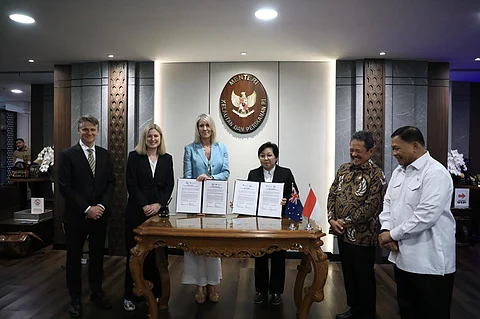

Australian and Indonesian delegations after signing a joint statement to strengthen cooperation on fish quality assurance.
Photo: Indonesia's Ministry of Maritime Affairs and Fisheries (KKP).
Following Australian Prime Minister Anthony Albanese's visit to Indonesia in May, on July 31, Australia's Minister for Agriculture, Fisheries and Forestry, Julie Collins, met in Jakarta with Indonesia's Minister for Maritime Affairs and Fisheries, Sakti Wahyu Trenggono, where the two countries reaffirmed their commitment to maintain and strengthen their fisheries ties.
According to the release issued by Indonesia, the bilateral meeting - which Australia's Ministry of Fisheries described as "productive discussions" - addressed various strategic cooperation opportunities in the marine and fisheries sector, including a shared commitment to strengthening the quality assurance and safety of fishery products between the two countries.
Both the Australian Ministry of Agriculture, Fisheries and Forestry (DAFF) and the Indonesian Ministry of Maritime Affairs and Fisheries (KKP) emphasized that the two countries share a long-standing fisheries trade relationship backed by a strong degree of complementarity between the two economies.
In addition to trade, Australia and Indonesia have a long history of bilateral partnership in fisheries management, aquatic animal health, and biosecurity cooperation. In terms of quality assurance and fish product safety, the two countries share joint inspections, familiarization efforts, and knowledge sharing, but also cooperate closely on fisheries, including on shared fish stocks and through regional fisheries bodies.
"Australia values its strong embedded ties to Indonesia on many fronts, including on fisheries management – an industry critical to our economies and food security," the Australian Minister for Agriculture, Fisheries and Forestry, Julie Collins, said. "The Albanese Government is committed to strengthening cooperation in fisheries policy and regulation with Indonesia, which is why today's meeting was so important," she added.
In its release, Australia also remarked that it hopes to deepen cooperation between the two countries through the program to combat illegal, unreported and unregulated fishing and to promote sustainable fisheries in Southeast Asia.
As Indonesia currently exports a large number of fish products to Australia, known for its high quality and food safety standards, the KKP's release on the agreement, for its part, focused on strengthening fish quality assurance cooperation between the two countries. According to the Indonesian Ministry of Maritime Affairs and Fisheries, more than 2,000 types of fish products from Indonesia are shipped to Australia, and that figure is expected to continue to rise.
"We want to ensure that the quality and safety are maintained so that even more products can enter the Australian market," Ishartini, head of the Seafood and Fisheries Quality Assurance and Control Agency, said Monday, commenting on last week's meeting.
"As an initiative, KKP has proposed several cooperation programs to strengthen the fishery product quality assurance system, including joint pre-border inspection, market control and surveillance of fishery products, food safety enforcement, fishery sanitation and hygiene, and capacity building for microbiological testing of fish-based food," she added.
As the body responsible for end-to-end quality assurance of marine and fishery products, KKP's Quality Agency oversees the acceptance of exports to Australia through nine fisheries certifications. In addition, it has facilitated 184 Fish Processing Units (UPI) in penetrating the Australian market with ten main commodities: canned tuna, canned sardines, pouched tuna, fresh tuna loin, goldband snapper, frozen sardines, carrageenan, tropical snapper, frozen tuna saku, and king snapper.
